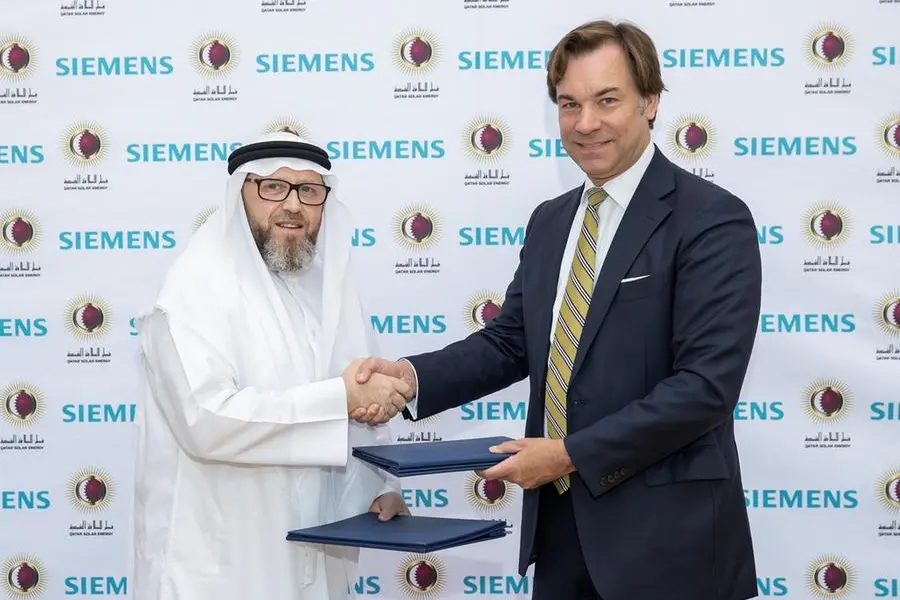PHOTO
- The hybrid power system will enable QSE to save on electricity and curtail carbon emissions
Siemens will deploy the Middle East's first microgrid designed for industrial use, enabling Qatar Solar Energy (QSE) to reduce electricity costs, curb carbon emissions and benefit from a more stable power supply.
The microgrid at QSE's factory in Doha will comprise a mix of energy sources -- the local grid, solar panels, battery storage, back-up generators and cooling system. Generating as much as 1 megawatts from the sun, the hybrid network will enable QSE to trim its electricity bills by maximizing use of solar power and storing energy in batteries to satisfy on-peak demand.
“This project will be a showcase for Siemens to demonstrate its grid edge capabilities and the value it brings to industrial customers and buildings by helping them to lower energy costs, rein in carbon emissions and ensure a more dependable power supply,” said Helmut von Struve, the CEO of Siemens in the Middle East. “We look forward to helping QSE enhance its operations by leveraging the many benefits of microgrids.”
Siemens will provide the microgrid's control panel, power meters, photovoltaic inverters and Siemens software for Distributed Energy Optimization (DEOP) to monitor the network's energy flow. QSE manufactures solar panels and related electronic equipment with the aim of making the country a global renewable energy technologies development and leadership hub.
“QSE is committed to providing innovative products that will accelerate the adoption of renewable energy in Qatar and around the world,” said QSE’s Chairman Salim Abbassi. “By deploying this microgrid from Siemens, we will prove that clean power is reliable and affordable at an industrial scale, and this enables us to press ahead with our growth strategy in the expanding market for renewable energy.”
The Siemens-supplied microgrid will be the first at an industrial site in the region to be connected to a conventional power grid. It has the potential to serve as a model for other Middle Eastern businesses and industries that want to cut their operating expenses while contributing to the fight against climate change.
Microgrids are transforming power supply systems worldwide. Solar, wind and other renewable energy sources, together with grid automation and controls that are more stable and intuitive, are spurring the development of localized, autonomous grids. These new networks enable campuses, industries, and remote areas to operate their own grids. They also can go a step further and accelerate the emergence of prosumers – or consumers who generate surplus energy and sell it in the microgrid or to the main grid, if it's connected.
Microgrids are expected to expand across the Middle East. Some rural areas, for example, currently use small diesel generators to power communities. An increased renewable power capacity, along with stable, reliable and efficient microgrids, can help these rural areas phase out some of these polluting diesel power plants. Campuses, industrial zones, military bases and islands can likewise benefit from the reliable and sustainable power supply microgrids offer.
-Ends-
Contact for journalists
Mohammed Aly Sergie
E-mail: mohammed.aly-sergie@siemens.com
About Siemens AG
Siemens AG (Berlin and Munich) is a global technology powerhouse that has stood for engineering excellence, innovation, quality, reliability and internationality for more than 170 years. Active around the world, the company focuses on intelligent infrastructure for buildings and distributed energy systems and on automation and digitalization in the process and manufacturing industries. Siemens brings together the digital and physical worlds to benefit customers and society. Through Mobility, a leading supplier of intelligent mobility solutions for rail and road transport, Siemens is helping to shape the world market for passenger and freight services. Via its majority stake in the publicly listed company Siemens Healthineers, Siemens is also a world-leading supplier of medical technology and digital health services. In addition, Siemens holds a minority stake in Siemens Energy, a global leader in the transmission and generation of electrical power that has been listed on the stock exchange since September 28, 2020.
In fiscal 2021, which ended on September 30, 2021, the Siemens Group generated revenue of €62.3 billion and net income of €6.7 billion. As of September 30, 2021, the company had around 303,000 employees worldwide. Further information is available on the Internet at www.siemens.com.
Siemens AG
Communications Head: Lynette Jackson
Werner-von-Siemens-Straße 180333 Munich
Germany




















